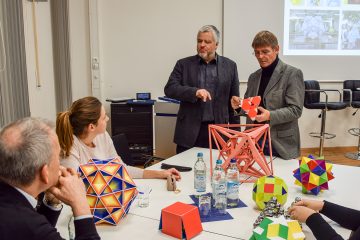Digital metrics in football
![TV expert for ZDF Kathrin Lehmann (Sportbusiness Campus), emcee Tim Frohwein (acatech Office), Alexander Altenhofen (DFL Digital Sports), Boris Otto (Fraunhofer Institute for Software and Systems Engineering ISST Dortmund) and acatech President Jan Wörner [top left to bottom right]. (Photo: Shutterstock/janews)](https://en.acatech.de/wp-content/uploads/sites/6/2023/02/News-Foto-aaD-Fussball_1000x700.jpg)
Munich, 10 February 2023
The analysis and commercial use of data – also referred to as data economics – is changing football. For example, since 2020 Deutsche Fußball Liga (DFL), the league association responsible for the organisation of German professional football, has been using cloud computing services to record and analyse in real time the performance data of players in the Bundesliga. What does this mean for managers and players? What added value does this create for fans and spectators? Kathrin Lehmann, TV expert for ZDF, data economist Boris Otto and DFL manager Alexander Altenhofen discussed this and other questions at acatech am Dienstag on 7 February.
acatech President Jan Wörner opened the second acatech am Dienstag of 2023 with a trip down memory lane. The infamous third goal scored by England in the final of the 1966 World Cup against Germany would never have been awarded if goal-line technology had existed – plus Germany would have had one more World Cup title today, he postulated, tongue in cheek.
Without doubt football – the most popular sport in Germany and indeed the world – has undergone significant change since then thanks to digital technology. It must be said that the technological possibilities today go far beyond determining whether the ball has fully crossed the line or whether a player is offside or not. In his introductory talk, Boris Otto, director of the Fraunhofer Institute for Software and Systems Engineering ISST in Dortmund, went into a number of fields of data economics that are of relevance to football. For example, it is down to progress in the area of sensor technology that more and more professional players wear tracker vests on the football pitch. They collect data about physical function and movement; huge volumes of data. Analysis of these and other football data is getting better and better. Thanks to progress in the area of machine learning – i.e. ChatGPT – the means for professional clubs to draw the right conclusions from the data are improving all the time, said Boris Otto. Another interesting field is opening up: the virtual world of the metaverse offers various opportunities for professional clubs to implement new business models, such as in the area of esports.
DFL, which incorporates the clubs in the first and second divisions of professional football in Germany (1. and 2. Bundesliga), already has a presence in many of the fields outlined by Boris Otto. As Alexander Altenhofen, Director Product & Technology at DFL Digital Sports, pointed out in the debate, the league association uses the data economy in particular to hyperpersonalise the fan experience. For instance, any fan – whether they are in the stadium itself or watching at home on the couch – can obtain the additional information they need using the DFL apps. He gave the example of an augmented reality application that enables spectators in the stadium to select players on the pitch using the camera on their smartphone and then performance data – such as the player’s speed – is shown in real time on the screen. This is possible thanks to 5G technology’s low latency.
TV expert for ZDF and former professional footballer Kathrin Lehmann highlighted that the increasing use of metrics in football is not all positive. Her view is that, in general, data economics is steering football down the path of American football, where success depends on rehearsed plays rather than players’ decisions. She went on to say that it is becoming increasingly likely that, with all the digital self-monitoring, players will lose touch with their own bodies and their own playing abilities if it is instilled in them that good play is defined by certain stats. It is important to be responsible with data and always use qualitative analysis.
After a closing discussion with the audience, which went into the topic of esports in greater detail, the three panellists ventured their predictions for the future. Asked about EURO 2032, Alexander Altenhofen outlined his vision of a virtual stadium experience. Wearing a Virtual Reality headset, spectators may be able to watch the EURO final live in the stadium while in fact sitting at home on the couch with friends. Boris Otto predicted that the much-criticised concept of a Super League – a league contested only by the top European clubs – could be a reality by then. Such a league would probably only field highly tuned players wearing earpieces, added Kathrin Lehmann. At any rate, all three agreed that digitalisation and the associated data economy will continue to change football definitively.




